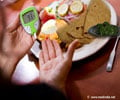Father's exercise regimen was found to affect his offspring's metabolic health, stated new research.

‘Small RNAs in sperm could help transmit paternal environmental information to the next generation.’





The study was led by Laurie Goodyear, PhD, senior investigator and head of the Section on Integrative Physiology and Metabolism at Joslin and professor of medicine at Harvard Medical School. The study was co-led by Kristin Stanford, PhD, a physiology and cell biology researcher who is now with The Ohio State University College of Medicine at the Wexner Medical Center. Goodyear and Stanford investigated how a father's exercise regimen would affect his offspring's metabolic health. Using a mouse model, they fed male mice either a normal diet or a high-fat diet for three weeks. Some mice from each diet group were sedentary and some exercised freely. After three weeks, the mice bred and their offspring ate a normal diet under sedentary conditions for a year.
The researchers report that adult offspring from sires who exercised had improved glucose metabolism, decreased body weight and a decreased fat mass.
"It really shows how important it is for men to exercise prior to conceiving because it will have lifelong effects on the health of their offspring. When we put the males on a high-fat diet, it had a terrible effect on the offspring; but what was surprising was that situation was completely reversed when the male added in exercise. So translated to humans, even if dad isn't eating really well, he can still affect his offspring positively by exercising," said Goodyear. "This also will dramatically decrease the risk of developing type 2 diabetes for the offspring," added Goodyear.
The team also found that exercise caused changes in the genetic expression of the father's sperm that suppress poor dietary effects and transfer to the offspring. "We saw a strong change in their small-RNA profile. Now we want to see exactly which small-RNAs are responsible for these metabolic improvements, where it's happening in the offspring and why," Stanford said.
Advertisement















